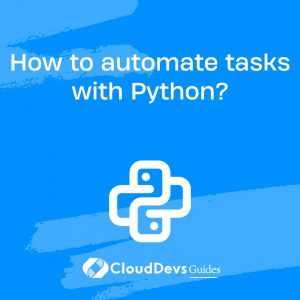Python Q & A
How to automate tasks with Python?
Python is a versatile language that excels at automation due to its readability, extensive standard library, and a rich ecosystem of packages. Here’s a concise guide on how you can automate tasks using Python:
- Scripting: Python’s basic strength lies in its scripting capability. You can automate repetitive tasks, such as file manipulation or text processing, by writing simple scripts. The built-in `os` and `shutil` modules allow for file and directory operations, while `re` can be employed for regex-based text processing.
- Web Automation: For automating web-related tasks, the `requests` library lets you make HTTP requests, simulating activities like form submissions or web scraping. For more complex interactions like simulating clicks or filling in web forms, `Selenium` is a powerful tool.
- Scheduled Execution: If you need to run tasks at specific times or intervals, Python’s `schedule` library or the system’s native task scheduler (like `cron` on Linux or Task Scheduler on Windows) can be invaluable.
- Automate Excel Operations: The `openpyxl` package provides functionalities to read from and write to Excel files, making automation of spreadsheet-related tasks simple and effective.
- GUI Automation: For tasks that involve interacting with desktop applications, `PyAutoGUI` can simulate mouse movements, keypress events, and other GUI interactions.
- API Automation: If you’re working with external services, you can use Python to automate API interactions. Many services provide Python SDKs or you can utilize `requests` to make API calls directly.
- Automation Frameworks: There are frameworks like `Airflow` and `Luigi` designed to automate workflows, especially in data processing and ETL tasks.
- Notification Systems: Once tasks are completed, you may want notifications. Libraries like `smtplib` for sending emails or integration with services like `Slack` can keep you updated.
Python’s wide-ranging libraries and its expressive syntax make it an ideal choice for automation, whether you’re dealing with web tasks, file operations, data processing, or even GUI interactions. The key is to identify repetitive tasks and leverage the appropriate libraries and tools in the Python ecosystem to simplify and automate them.

Previously at

Senior Software Engineer with 7+ yrs Python experience. Improved Kafka-S3 ingestion, GCP Pub/Sub metrics. Proficient in Flask, FastAPI, AWS, GCP, Kafka, Git




